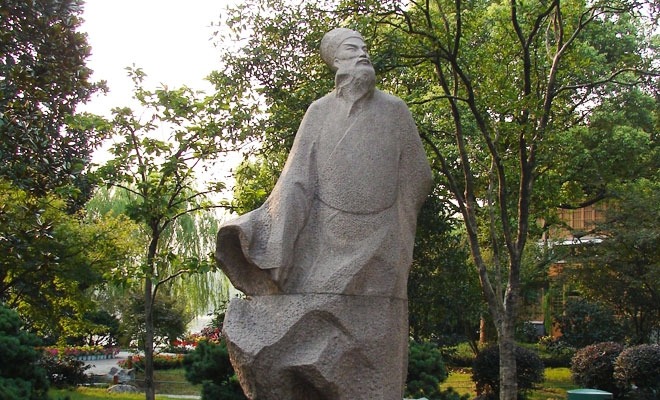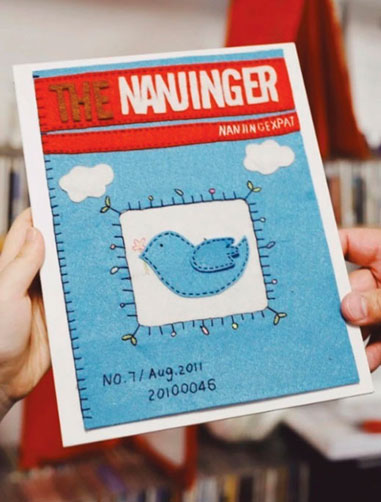Wherever one goes in the world, there to be found is literature steeped in culture and history, truly inaccessible to all but the most determined.
China is no exception. Unsurprisingly, the country has a vast cannon of literary and poetic works. Herein, The Nanjinger lifts the lid on one of the major heavyweight’s of classical Chinese and world literature, Su Dongpo. Alert readers who have visited Hangzhou’s beautiful West Lake may be familiar with the name, having seen the Su Causeway and a Memorial Museum to the man on the banks of the lake.
Of the three perfections esteemed in traditional Chinese culture, that of poetry, painting and calligraphy, Su Dongpo ticked all the boxes. His poems are renowned for their display of profound erudition and beauty and are prime material for high school textbooks around the country; his painting, well, he created a school which later became one of the most important styles in Chinese fine arts. As for his calligraphy, his work Tie (roughly pronounced T-air) of the Cold Food Festival has been regarded as the third best example of Chinese grass script calligraphy since at least the Ming dynasty (being bested only by the tenth-dan black belts of Chinese calligraphy, Wang Xizhi and Yan Zhenqing), and it is the first poem of two from this scroll that we will discuss briefly here.
Su Dongpo was a prominent government official during the reign of Shenzong, an era punctuated by political factionalism concerning two extremely divisive cliques, that of the conservatives (Su Dongpo and co.) and that of the reformers (Wang Anshi et. al.). This was a time of intrigue and plots where the most innocent of writings could be interpreted by dastardly exegetes as alluding to the shortcomings of prominent figures. It was one of Su’s poems that got him in a whole heap of trouble, as the opposition accused him of surreptitiously criticising the man at the top, Wang Anshi, within its ambiguous verse. As a result, he was exiled to a place that could only seem like the other end of the universe to the Song official, Huangzhou, in modern Hubei.
自我来黄州,已过三寒食。
Since arriving at Huangzhou, the Cold Food Festival has already passed 3 times.
年年欲惜春,春去不容 惜。
Every year I try to treasure spring, but spring departs not tolerating my sentiments.
今年又苦雨,两月秋萧瑟。
The rains, bitter again this year, for two months the trees have rustled as if in autumn.
The first three lines set the scene. It is 1080 CE. Su Dongpo has been exiled in the provincial backwater, Huangzhou, for approximately 3 years. It is glorious spring time and the poet wishes it were not so fleeting; it should be convivial to the poet’s spirit, yet it is raining, bitter and cold. He is dispirited and continues….
卧闻海棠花,泥污燕脂雪。
Lying down, I am told that flowers of the crab apple have withered and fallen, the dirt sullies this snow of rouge.
Here we really begin to appreciate the craftsmanship of the man. Su Dongpo loved crab apple flowers and was to write a poem about them 4 years later while still exiled in Huangzhou. He is lying down and has heard news of the flowers falling to the ground and likens the scene to a snow of rouge. But the dirt sullies the snow of flower petals. Su Dongpo is in fact referring to himself; he is the fallen petals and the dirt (Huangzhou) has corrupted his talents. As a Confucian, government official and humanitarian, we can only begin to imagine the frustration of being tossed away from the centre of palace politics to a parochial post a million miles from the action.
暗中偷负去,夜半真有力。
In darkness they are stolen, midnight really has a strength of its own.
何殊病少年,病起头已白。
How is this any different from a youth having recovered from illness, only to find a head of grey hair?
The first line is an allusion from the Zhuangzi, one of three seminal texts of the Daoist canon. Su Dongpo, like other classical scholars in imperial China, learnt from an early age by copying books. The idea being that a reader would become much more intimate with a work if he copied it from cover to cover. Su Dongpo coined the idea of disciplined spontaneity, which referred to this very idea; that by becoming so familiar with a work, one could not only recite it, but wield the knowledge spontaneously, should the need arise. The actual meaning of the allusion is that time has taken away the petals, just as it has taken away his best years. In the last line, the poet laments how he has suffered from the illness of exile throughout his formative years. He will be reinstated, but what’s the use? His best days will have passed and he will have degenerated. Fortunately for us (and history), Su Dongpo was eventually reinstated and once again became a vigorous participant in palace politics (but was again exiled twice more).
Only once we peer into this remote literature may we understand the true majesty of the man’s craft, but we can already begin to marvel at the genius of Su Dongpo.











